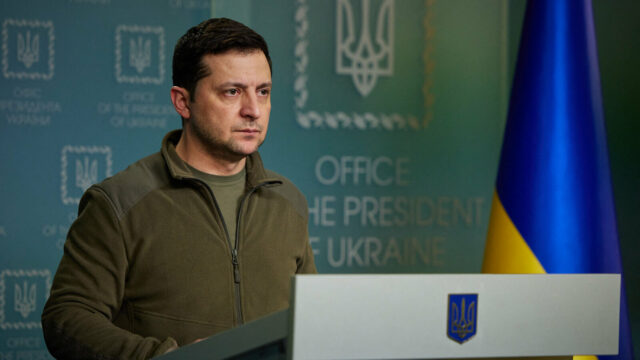
Zelenskyy Defines Putin’s Russia as an Evil Empire
Publication: Eurasia Daily Monitor Volume: 19 Issue: 151
By:

When former US President Ronald Reagan described the Union of Soviet Socialist Republics (USSR) as “an evil empire” in 1983, he did not so much transform the situation on the ground as he changed the way the nations and peoples within the Soviet Union and elsewhere viewed the country. Because Reagan described it as evil, the American leader provided a new reason for people within the USSR and around the world to fight it; because he described it as an empire, he made clear that it must be decolonized. Now, almost 40 years leader, Ukrainian President Volodymyr Zelenskyy has done something analogous, albeit rhetorically less soaring than his American predecessor: Zelenskyy has reminded the peoples of the Russian Federation and the world that Vladimir Putin’s Russia is not only evil for its actions at home and abroad but also an empire that must be decolonized (President.gov.ua, September 29; for an informal English translation, see Window on Eurasia, October 9).
Some may dismiss the Ukrainian leader’s appeal to the non-Russian nations within the current borders of Russia as nothing more than the latest example of the long-standing stratagem to weaken enemies by appealing to minority groups within their borders—and given the war Moscow has unleashed against Ukraine, such assumptions are entirely natural. Yet, what Zelenskyy has done may ultimately affect far more than simply the outcome of the current conflict—in much the same way as Reagan’s words nearly four decades ago affected not only the final course of the Cold War but also opened the way to the end of the USSR, as well as independence for the three Baltic countries and the other 12 Soviet republics. The Russian Federation of today, in contrast to these countries, is not a new nation-state but rather merely a smaller version of the USSR—that is, an empire seeking to expand at the expense of its neighbors to save itself. But this iteration of empire is even more dangerous to both its own population and the world because it is animated not by an internationalist ideology but by an increasingly nationalist one.
Even before Putin launched his re-invasion of Ukraine on February 24, Ukrainian leaders had argued that Russian aggression abroad and repression of non-Russians at home are closely intertwined. Since 1991, these leaders have focused attention on Russian repression of the ethnic Ukrainians within the current borders of the Russian Federation, who live in areas that Kyiv refers to as “wedges.” They also emphasized Moscow’s mistreatment of other non-Russian nations there. The Ukrainian parliament and government have issued calls for the international community to sanction Moscow for these actions not only because such measures are wrong but also because of their consequences for Russia’s neighbors and the world as a whole (Afternempire.info, December 9, 2018; Facebook.com/Free.IdelUral, April 16, 2019; Idel.Realities, April 24, 2021).
Zelenskyy’s words about Russian repression of non-Russians are the latest and highest-level aspect of this campaign, but they are far from the only ones. And the other steps Kyiv has taken are noteworthy. Not only has Ukraine welcomed a variety of volunteers from the non-Russian nations to help it fight the Muscovite invaders, but it has also served as a refuge for non-Russian activists who have been forced to flee Russian persecution. The country has also promoted organizations, such as the League of Free Nations of Post-Russia, which bring together non-Russian nationalists and Russian regionalists opposed to Moscow and interested in independence for their own peoples (Idel-ural.org, May 20; Idel.Realities, June 30, 2021, April 16).
Even these Ukrainian actions have annoyed Moscow, although most of them have passed below the radar screens of Western media and governments. But these moves have had an important impact on the non-Russian peoples and Russian regionalists within the current borders of the Russian Federation. By reminding them that they are not being ignored and thus not alone, these actions have opened the way for more people in Russia to speak out not only in opposition to Putin’s war in Ukraine but also in support of their own rights. And just as Reagan’s words led more people in the USSR to say that they were not Soviets but Estonians, Ukrainians, and all the others, so too, Ukrainian actions and now Zelenskyy’s words are causing ever more people within Russia to reject Putin’s notion that they are all part of his “Russian world.”
Perhaps the clearest case of this change came in Dagestan in early October 2022, when women protesting the war there declared that “the rhetoric about the Russian world does not work” in their North Caucasus republic because “we are not Russians” (Meduza, October 7). Obviously, neither Ukraine’s actions up to now nor even Zelenskyy’s words explain the Dagestani women’s passionate insistence on that point. But both, similar to Reagan’s words and actions, are helping change the world in ways that make such statements more likely and more consequential. Such an approach potentially opens the way to transformations that few now think possible, just as few thought the demise of the evil empire described by Reagan would happen so remarkably soon after he made his famous declaration. If that should prove to be the case again, Zelenskyy’s words will be remembered as a turning point in world history—one much more dramatic than the other events now taking place in Russia and Ukraine.



